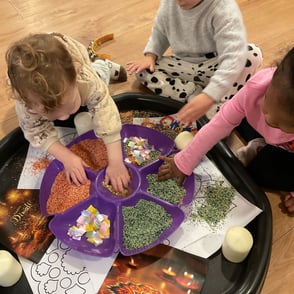Children don’t just learn to read, write, and count in their early years. They also learn how to manage feelings, express empathy, and connect with others, skills collectively known as emotional intelligence (EI).
A lack of emotional intelligence in children can show up as frequent outbursts, trouble making friends, or difficulty coping with change. Research highlights that emotional intelligence in early years directly influences lifelong wellbeing, academic success, and even leadership potential (Goleman, 1995; Denham et al., 2003).
The good news? Unlike IQ, which is relatively fixed, emotional intelligence can be taught, modelled, and strengthened. With the right support from parents and educators, children can develop resilience, empathy, and wisdom to navigate life’s challenges.
Book Online TourBook A VisitWhat Is Emotional Intelligence? A Simple Definition for Parents
Before tackling a lack of EI, we need a clear definition.
Emotional intelligence refers to the ability to:
- Recognise one’s own emotions.
- Understand others’ emotions.
- Regulate and express feelings appropriately.
- Build healthy relationships based on empathy and respect.
Psychologist Daniel Goleman, who popularised the concept, described five components of emotional intelligence:
- Self-awareness
- Self-regulation
- Motivation
- Empathy
- Social skills
For children, this might look like:
- Naming feelings (“I feel sad”) instead of crying uncontrollably.
- Waiting patiently for a turn.
- Comforting a classmate who’s upset.
When these abilities are underdeveloped, we see the signs of low emotional intelligence which technically are difficulty cooperating, impulsivity, or lack of empathy.
Signs of Low Emotional Intelligence in Children
How can parents and teachers recognise when a child is struggling with EI? Common indicators include:
- Frequent tantrums beyond toddler age.
- Difficulty making or keeping friends.
- Trouble expressing needs verbally.
- Blaming others constantly without self-reflection.
- Resistance to rules or boundaries.
- Low tolerance for frustration or change.
It’s important to remember: these are not permanent traits. They are developmental gaps that can be filled with intentional guidance.
Why Do Some Children Struggle with Emotional Intelligence?
A lack of EI can stem from multiple factors, including:
- Limited modelling at home – If children don’t see adults managing emotions well, they may not learn how.
- Developmental delays – Some children take longer to develop emotional regulation.
- Trauma or stress – Adverse experiences can make children reactive or withdrawn.
- Overemphasis on academics – When early education prioritises literacy and numeracy over emotional development, EI skills may lag.
As UNICEF (2018) notes, social and emotional learning (SEL) is just as vital as academics in shaping a child’s future.
How to Help Children Overcome a Lack of Emotional Intelligence
1. Model Emotional Awareness
Children learn by imitation. When adults openly share feelings, “I feel frustrated, but I’ll take a deep breath”, children see healthy regulation in action.
2. Teach the “Feelings Vocabulary”
A child who can only say “mad” or “sad” struggles to describe complex emotions. Parents and teachers can expand their vocabulary with picture books, emotion cards, and daily check-ins (“Are you feeling worried, excited, or calm today?”).
3. Encourage Empathy through Role Play
At Hatching Dragons, role play is a daily practice, helping children step into others’ shoes. For example, children might “run a café” or act out comforting a crying friend. These role play in EYFS moments foster understanding and social negotiation skills.
4. Use Stories and Books
Structured stories about emotions, told in both languages, help children understand complex feelings while also nurturing their cultural awareness and expanding their emotional intelligence in early years.
5. Create Safe Spaces for Expression
Quiet retreats, whether in a nursery classroom or at home, allow children to pause, process, and manage overwhelming feelings in a supportive setting.
6. Praise Emotional Growth
Praise not just academic achievements but also emotional wins: “I saw how patiently you waited. Well done!” This reinforces emotional intelligence skills as valued accomplishments.
A Week at Hatching Dragons: Overcoming Low Emotional Intelligence
Last week at Hatching Dragons, in the month of August, our educators designed a series of activities to nurture empathy, values, and emotional intelligence in children. While our approach changes from month to month, each week offers new opportunities for children to explore feelings, relationships, and resilience through play and learning.
- Monday: Morning circle began with emotion check-ins using picture cards—children shared how they felt and why.
- Tuesday: Role play focused on sharing scenarios, such as “How do we ask for a turn on the toy car?” Educators narrated in English and Mandarin, reinforcing empathy: “Can I turn? / Wǒ kěyǐ lún ma?”
- Wednesday: Story time featured a multicultural tale about kindness. Reflective questions encouraged children to think: “How did the character feel? What could they have done differently?”
- Thursday: Cooperative art projects, like building maps and creating emotions-based collages, promoted teamwork and shared creativity.
- Friday: The “Value Wall” was updated with examples of emotional intelligence observed during the week such as comforting peers, taking turns, or showing kindness; celebrating children for acts of empathy.
This August snapshot shows how we weave emotional intelligence into daily learning, with new activities and cultural lessons each month.
How Hatching Dragons Stands Apart
Unlike traditional early years settings that focus heavily on academics, Hatching Dragons integrates values in childcare with emotional intelligence development. Bilingual learning, cultural storytelling, and social-emotional activities are woven into daily routines.
This holistic approach not only prepares children for school but also instils empathy, resilience, and cultural awareness, the qualities essential for lifelong learning.
Backed by Research: The Impact of Emotional Intelligence
Studies show that children with higher emotional intelligence:
- Achieve better academic outcomes (Rivers et al., 2012).
- Report lower levels of anxiety and depression (Mavroveli & Sánchez-Ruiz, 2011).
- Develop stronger leadership and social skills later in life (Côté, 2014).
The World Economic Forum (2020) even listed emotional intelligence as one of the top ten skills for the future workforce.
Clearly, building EI in early years is not optional; it’s simply foundational.
FAQs
Q1: What does it mean to be emotionally intelligent?
Being emotionally intelligent means recognising and managing emotions in yourself and others. It helps children build healthy relationships and make wise decisions.
Q2: How can I improve my child’s emotional intelligence at home?
To improve emotional intelligence at home, model emotions, read stories about feelings, encourage empathy through play, and create safe spaces for expression.
Q3: What are the signs of low emotional intelligence?
Common signs of low emotional intelligence in children include frequent tantrums, difficulty making friends, inability to express feelings, and poor coping with change.
Q4: Can emotional intelligence be taught?
Yes. Unlike IQ, emotional intelligence develops through consistent modelling, practice, and social-emotional learning.
Q5: Are there tests for emotional intelligence?
Yes, there are child-friendly EI assessments, though observation in daily life is often the most accurate measure.
Conclusion: Nurturing Wisdom from the Start
Helping children overcome a lack of emotional intelligence is one of the most powerful gifts parents and educators can give. By modelling empathy, teaching feelings vocabulary, and integrating values in childcare, we raise children who are not only academically capable but also emotionally wise.
Emotional intelligence in early years shapes growth, resilience, and the ability to build meaningful relationships. It’s the cornerstone of lifelong learning and it starts with the everyday choices we make in guiding our children.
Call to Action: See Emotional Intelligence in Action
At Hatching Dragons, we believe emotional intelligence development deserves as much attention as academic milestones. Our nurseries integrate values in childcare, daily role play, and bilingual learning to nurture children who are socially confident, emotionally aware, and culturally attuned.
Book a visit today and experience how our holistic approach helps children thrive; one heartfelt moment at a time.
References:
- Côté, S. (2014). Emotional intelligence in organizations. Annual Review of Organizational Psychology and Organizational Behavior, 1(1), 459–488.
- Denham, S. A., Blair, K. A., DeMulder, E., Levitas, J., Sawyer, K., Auerbach–Major, S., & Queenan, P. (2003). Preschool emotional competence: Pathway to social competence? Child Development, 74(1), 238–256.
- Goleman, D. (1995). Emotional Intelligence: Why It Can Matter More Than IQ. Bantam.
- Mavroveli, S., & Sánchez-Ruiz, M. J. (2011). Trait emotional intelligence influences on academic achievement and school behaviour. British Journal of Educational Psychology, 81(1), 112–134.
- Rivers, S. E., Brackett, M. A., Reyes, M. R., Elbertson, N. A., & Salovey, P. (2012). Improving the social and emotional climate of classrooms: A clustered randomized controlled trial. American Journal of Community Psychology, 50(1–2), 1–14.
- UNICEF. (2018). The State of the World’s Children 2019: Children, food and nutrition.

08-Sep-2025 17:37:13
Related Articles







Write a Comment